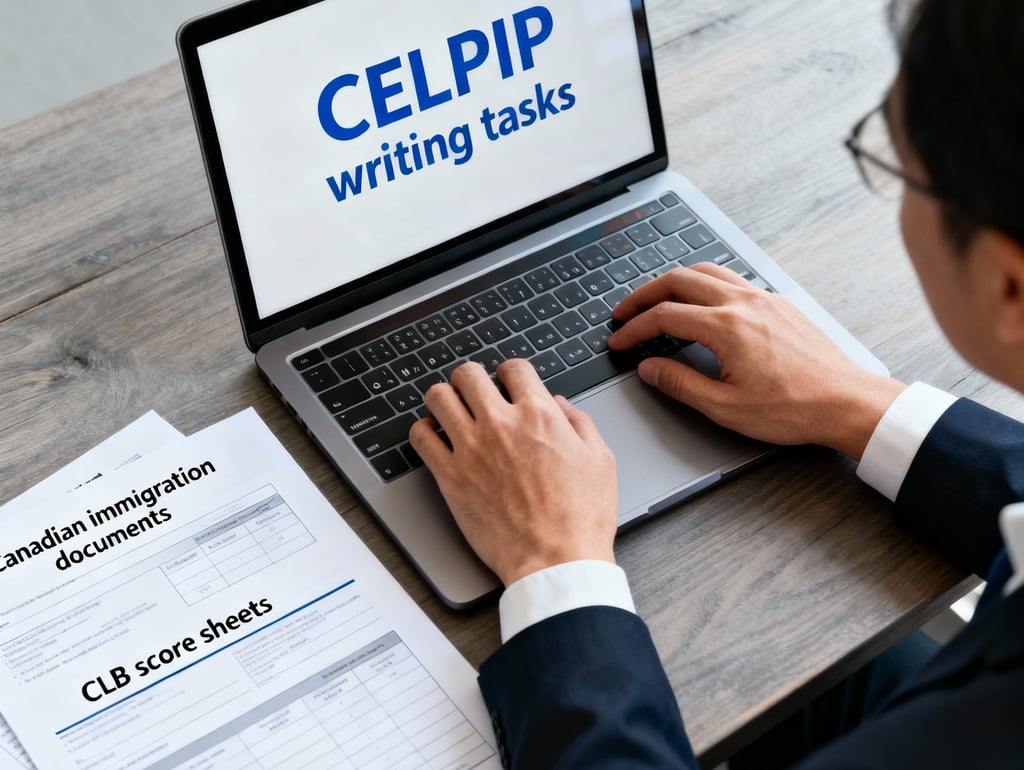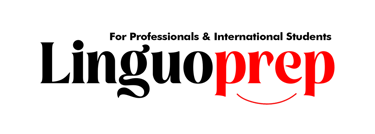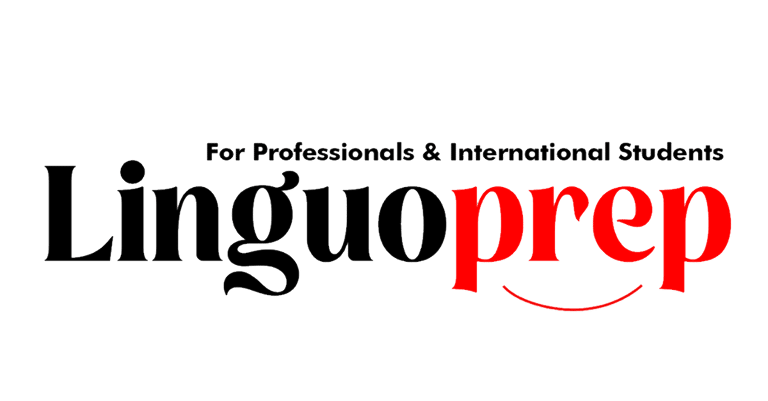Mastering CELPIP Writing Tasks: Strategies and Templates for CLB 10 Success in 2025
CELPIP Writing can make or break your Canadian immigration application, directly impacting your Express Entry (Comprehensive Ranking System CRS) score and eligibility for Provincial Nominee Programs. With only two writing tasks but significant weight in your overall assessment, achieving CLB 10+ in writing requires strategic preparation that goes beyond basic English proficiency
swati
9/29/20257 min read


Master CELPIP Writing Tasks: Complete Templates and Strategies for CLB 10 Immigration Success in 2025
CELPIP Writing can make or break your Canadian immigration application, directly impacting your Express Entry Comprehensive Ranking System CRS) score and eligibility for Provincial Nominee Programs. With only two writing tasks but significant weight in your overall assessment, achieving CLB 10+ in writing requires strategic preparation that goes beyond basic English proficiency.
This comprehensive guide reveals the proven templates, strategies, and techniques that have helped over 27,000 students achieve their target CLB scores with a 95% success rate. Whether you're aiming for the minimum CLB 7 for immigration eligibility or targeting CLB 10+ for maximum competitive advantage, mastering CELPIP Writing is your pathway to Canadian settlement success.
Understanding CELPIP Writing: Structure and Assessment
Task Overview and Time Allocation
CELPIP Writing consists of two distinct tasks completed within 53-60 minutes:
Task 1 Writing an Email (27 minutes)
Preparation time: 0-5 minutes
Writing time: 22-27 minutes
Word count target: 150-200 words
Context: Professional or personal email communication
Task 2 Responding to Survey Questions (26 minutes)
Preparation time: 0-5 minutes
Writing time: 21-26 minutes
Word count target: 150-200 words
Context: Opinion expression and detailed explanation
Assessment Criteria Breakdown
Understanding how your writing is evaluated enables strategic preparation:
Content/Coherence (25%)
Complete task fulfillment
Logical organization and idea development
Clear purpose and appropriate tone
Vocabulary (25%)
Range and accuracy of word choice
Precise meaning expression
Appropriate register and formality
Readability (25%)
Clear sentence structure and flow
Appropriate paragraph organization
Smooth transitions between ideas
Task Fulfillment (25%)
Address all prompt requirements
Appropriate length and detail level
Suitable format and structure
CELPIP Writing Task 1 Email Mastery
Understanding Email Task Types
CELPIP email tasks typically fall into four categories:
Complaint/Problem Resolution:
Product or service issues
Workplace conflicts
Community concerns
Academic or professional challenge
Information Request:
Program or service inquiries
Professional consultation requests
Academic or career guidance
Community resource information
Invitation/Social Communication:
Event planning and invitations
Social gathering coordination
Community involvement opportunities
Personal relationship communication
Application/Formal Request:
Job application follow-up
Program enrollment communication
Professional opportunity pursuit
Official documentation requests
The Universal Email Template
Paragraph 1: Opening and Context (30-40 words)
Subject: [Clear, specific subject line]
Dear [Appropriate salutation],
I am writing to [state purpose clearly] regarding [specific situation/issue]. I hope this
Paragraph 2 : Main Content and Details (80-100 words)
[Detailed explanation of situation/request]
[Specific examples or supporting information]
[Clear statement of what you need/want]
[Timeline or urgency indicators if relevant]
Paragraph 3 Action Request and Closing (40-60 words)
I would greatly appreciate [specific action requested] by [timeline if applicable]. Please
Sincerely,
[Your name]
Email Task Templates by Type
Complaint Email Template:
Subject: Urgent Resolution Required - [Specific Issue] - Account/Reference #Number
Dear Customer Service Manager, I am writing to express my serious concern regarding [specific problem] that occurred on [date]. As a valued customer for [duration], I have always appreciated your company's commitment to quality service, which is why this experience was particularly disappointing.
On [specific date], I [describe situation in detail]. Despite following all proper procedures and [any actions taken], the issue remains unresolved. This has caused [specific impact] and [consequences]. I have attached [relevant documentation] for your reference and immediate review.
I would appreciate a comprehensive resolution within [specific timeframe] that includes [specific requests]. Please contact me at [contact information] to discuss this matter further. I value our business relationship and hope for a swift and satisfactory resolution.
Sincerely,
[Your name]
Information Request Email Template:
Subject: Information Request - [Specific Program/Service] - Prospective
[Student/Customer/Participant]
Dear [Specific title/department],
I am writing to request detailed information about your [specific program/service] as I am actively considering [enrollment/participation/purchase]. Your organization's reputation for [specific quality] makes this opportunity particularly attractive to me.
Specifically, I would appreciate information regarding [list 23 specific questions]. Additionally, I am interested in understanding [specific aspect] and [another specific aspect]. My background includes [relevant experience/qualification] and I am particularly interested in [specific focus area].
Could you please provide [specific materials/information] and advise on [application/enrollment process]? I am available for [meeting/call] at your convenience and can be reached at [contact information]. Thank you for your time and I look forward to learning more about this opportunity.
Best regards,
[Your name]
Advanced Email Writing Strategies
Tone Appropriateness
Formal Professional Tone:
Use complete sentences and complex structures
Avoid contractions and casual expressions
Employ sophisticated vocabulary choices
Maintain respectful, business like approach
Semi-formal/Friendly Professional:
Balance professionalism with warmth
Use some casual elements while maintaining respect
Include personal touches when appropriate
Show genuine interest and appreciation
Canadian Politeness Integration
Canadian business communication emphasizes courtesy and indirectness:
Polite Request Structures:
"I would be grateful if you could..."
"Would it be possible to..."
"I hope you might consider..."
"Perhaps you could help me understand..."
Appreciation Expressions:
"I truly appreciate your assistance with..."
"Thank you for taking the time to..."
"I'm grateful for your prompt attention to..."
"Your help with this matter would be invaluable..."
CELPIP Writing Task 2 :Survey Response Excellence
Understanding Survey Question Types
Survey questions typically explore:
Personal Opinion Topics:
Education and career choices
Technology and social media impact
Environmental and sustainability issues
Community and civic participation
Comparative Analysis:
Traditional vs. modern approaches
Advantages and disadvantages
Multiple option evaluation
Preference justification
Problem-Solution Scenarios:
Community challenges
Workplace improvements
Educational system enhancements
Social issue resolution
The Universal Survey Response Template
Paragraph 1: Position Statement (40-50 words)
I strongly believe that [clear position statement] represents [significance/importance].
Paragraph 2: Supporting Argument with Example (70-90 words)
My position is supported by [first main reason]. For example, [specific, detailed example]
Paragraph 3: Counter-consideration and Conclusion (40-60 words)
While some might argue that [acknowledge opposing viewpoint], I maintain that [reaffirm y
Survey Response Templates by Topic Type
Opinion on Technology Impact:
I firmly believe that social media has fundamentally transformed modern communication in predominantly positive ways. Despite concerns about privacy and misinformation, the benefits of global connectivity and information access far outweigh the drawbacks for Canadian society.
This position is supported by the democratization of information and opportunity that social media provides. For example, during the COVID19 pandemic, platforms like Facebook and Instagram enabled small Canadian businesses to maintain customer relationships and continue operations through direct online engagement. My neighbor's bakery in Toronto survived lockdowns entirely through social media marketing and online ordering systems, demonstrating how these tools create economic resilience.
While critics rightfully point to issues like cyberbullying and digital addiction, I maintain that proper education and regulation can address these concerns without eliminating the tremendous benefits. Ultimately, social media represents a powerful tool for community building, economic opportunity, and democratic participation that strengthens Canadian society when used responsibly.
Community Problem-Solution Response:
I strongly believe that increasing community volunteer programs represents the most effective solution to social isolation among Canadian seniors. This approach addresses both immediate social needs and long-term community cohesion through intergenerational connection and mutual support. Evidence supporting this approach comes from successful programs across Canadian communities. For instance, the "Senior Buddy" program in Vancouver pairs university students with elderly residents for weekly activities and conversation. Participants report decreased loneliness, improved mental health, and valuable cultural exchange. The program costs minimal government resources while creating lasting relationships that benefit both demographics significantly. Although some might suggest that technology solutions or professional services could address senior isolation, I maintain that volunteer-based community programs provide more authentic, sustainable connections. Ultimately, building intergenerational relationships strengthens entire communities while addressing individual needs through genuine human interaction and shared Canadian values.
Advanced Survey Writing Techniques
Sophisticated Vocabulary Integration
Complex Tense Usage
Present Perfect Continuous:
"Canadians have been increasingly recognizing the importance of..."
Past Perfect:
"Before the pandemic began, most businesses had never considered..."
Future Perfect:
"By 2030, these initiatives will have transformed..."
Instead of basic words, use advanced alternatives:
Important → crucial, vital, fundamental, essential, significant
Good → beneficial, advantageous, constructive, productive, valuable
Bad → detrimental, counterproductive, problematic, concerning, adverse
Many → numerous, substantial, considerable, extensive, widespread
Complex Sentence Structures
Subordinate Clauses:
"While [contrasting idea], [main point] because [supporting reason]."
Participial Phrases:
"Having experienced [relevant situation], I understand [main point]."
Conditional Statements:
"If [hypothetical situation], then [logical consequence] would [result]."
Cohesive Device Mastery
Addition and Emphasis:
Moreover, furthermore, additionally, in addition, significantly
Contrast and Concession:
However, nevertheless, despite this, although, conversely
Cause and Effect:
Consequently, therefore, as a result, due to, because of this
Examples and Clarification:
For instance, specifically, namely, in particular, to illustrate
Grammar Excellence for CLB 10+
Advanced Grammar Patterns
Passive Voice for Formal Tone:
"Concerns have been raised about..." instead of "People are concerned about..."
Subjunctive Mood:
"I recommend that the government invest..." instead of "The government should invest..."
Inversion for Emphasis:
"Not only does this approach save money, but it also improves outcomes."
Time Management Strategies
Task 1 Email - 27 Minutes Breakdown:
Planning (3 minutes): Understand task, identify tone, outline structure
Writing (20 minutes): First draft with focus on content completion
Review (4 minutes): Grammar check, coherence verification, word count
Task 2 Survey - 26 Minutes Breakdown:
Planning (3 minutes): Form clear opinion, identify examples, plan structure
Writing (19 minutes): Complete response with detailed examples
Review (4 minutes): Polish language, check task fulfillment, final proofread
Common Writing Mistakes to Avoid
Task Fulfillment Errors
Incomplete address of all prompt elements
Inappropriate word count (too short or excessively long)
Wrong format or tone for the context
Language Use Mistakes
Overuse of simple vocabulary and sentence structures
Grammatical errors that impede understanding
Inconsistent tone throughout the response
Coherence Issues
Poor paragraph organization
Missing or ineffective transitions
Unclear connection between ideas
Canadian Context Integration
Cultural References
Incorporate authentic Canadian references:
Provincial differences and regional characteristics
Canadian business practices and workplace culture
Community involvement and civic participation
Environmental consciousness and sustainability
Professional Standards
Reflect Canadian professional communication norms:
Collaborative language and inclusive thinking
Respectful disagreement and compromise
Work-life balance considerations
Diversity and inclusion awareness
Preparation Timeline and Practice Schedule
Weeks 1-2 Foundation Development
Master template structures for both tasks
Practice basic grammar and vocabulary expansion
Complete 3-4 practice tasks per week
Weeks 3-4 Skill Refinement
Focus on sophisticated language use
Develop Canadian context integration
Increase practice to 5-6 tasks per week
Weeks 7-8 Test Readiness
Final polish on weak areas
Confidence building through repetition
Mock test simulation under exam conditions
Weeks 5-6 Advanced Techniques
Perfect time management strategies
Practice complex grammar structures
Complete full timed practice tests
Achieving CLB 10+ Writing Success
Mastering CELPIP Writing requires systematic preparation that combines template mastery, advanced language skills, and deep understanding of Canadian communication contexts. Success comes from consistent practice with strategic improvement focus rather than generic English writing practice.
The key to achieving CLB 10+ lies in demonstrating sophisticated language use while maintaining clear communication and complete task fulfillment. When your writing reflects genuine understanding of Canadian professional and social contexts, high scores become the natural result of thorough preparation.
Professional coaching can accelerate your progress by providing personalized feedback, advanced strategies, and cultural context training that self-study cannot provide. Expert guidance ensures you avoid common mistakes while developing the sophisticated writing skills needed for competitive immigration scores.
Ready to achieve CLB 10+ in CELPIP Writing and maximize your Canadian immigration potential? Book your FREE writing assessment and receive a personalized improvement strategy that has helped over 27,000 students achieve their Canadian dreams.
Transform your CELPIP Writing performance with expert coaching that guarantees results. Your Canadian future begins with mastering these essential communication skills.
👉 “ Ready to Hit CLB 7+ in Your Next CELPIP Attempt? ”
Book your FREE demo today — worth ₹5,000. Get a custom study plan within 2 hours.
Address:
492-A, Near Krishna Mandir, Model Town Extension, Ludhiana, Punjab.
Contacts
+1 800 9170 389
info@linguoprep.com
Subscribe to our newsletter


